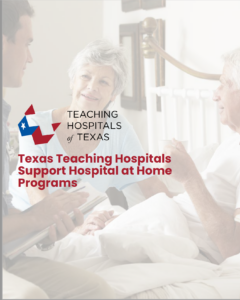Federal policies on health care financing and delivery, care for the uninsured, Medicaid and Medicare, the 340B prescription drug program, healthcare workforce training and Graduate Medical Education (GME) funding, and other issues affect Teaching Hospitals of Texas’ public and teaching hospital members serving critical roles for the state’s healthcare infrastructure.
Policies, funding, and financing methods that support this work are vital for keeping Texans safe and healthy.
Preserve Medicaid Integrity, Eligibility, and Financing
Texas’ Medicaid program helps provide health insurance and access to care for low-income children and pregnant women, individuals with disabilities and the elderly. Texas also has an 1115 Medicaid Waiver agreement with the federal government that supports programs including the Uncompensated Care program, which helps fund charity care for Texans without insurance. Medicaid is also an essential source of hospital supplemental payment funding, including state-directed payments and disproportionate share hospital (DSH) payments: all programs that support healthcare for low-income Texans or Texans with disabilities.
Medicaid programs, funding and financing have evolved since the program began in 1965. Matched federal and state funding and a federal guarantee to support covered services and populations have been an integral part of Medicaid.
However, as part of the budget reconciliation process, Congress is currently Medicaid funding and restrictions in financing in order to reduce federal Medicaid expenditures. If enacted, these federal policy changes will lead either to reductions in healthcare services, or increased tax and financing burdens within Texas.
Program changes and reductions under consideration include:
- Limiting currently available Medicaid financing mechanisms. Limiting Medicaid funding made possible through local provider participation fees (LPPFs) will reduce related federal Medicaid funding and support for Texas, unless alternate funding sources are identified.
- Restricting currently allowable financing to supplement Medicaid payment rates to hospitals up to commercial rates. Base Medicaid rates for non-rural hospitals pay for less than 60% of the costs of providing that care. Supplemental payment programs help bring rates up to cover more of the costs of care. One current option under consideration by Congress would limit these additional payments to Medicare payment levels.
In addition, Medicaid DSH continues to be a program at risk. This $2.2 billion in funding supports unfunded Medicaid and uninsured costs of care for Texans, and is at risk due to current reductions required by federal law. Congress has repeatedly delayed reductions, but without Congressional action, Texas will see cuts of nearly 33 percent or about $800 million per year in this critical program beginning October 1, 2025.
Maintaining state authority and flexibility to determine program eligibility within federally established parameters; maintaining current and historically approved financing to support hospital rates; maintaining current state authority to determine the amount of state-directed payments and continuing the historical state and federal partnership to provide healthcare to low income, uninsured and vulnerable Texans are critical for all Texans.
Continue Hospital at Home Waiver Authority
Federal legislation authorizing the continuation of Hospital at Home programs was originally authorized as a COVID-19 public health emergency (PHE) waiver. What we learned is that this program keeps patients healthier and increases access to hospital services. With the end of the PHE in 2023, Hospital at Home authority has been extended multiple times through Continuing Resolutions, most recently in March 2025 to extend authority through the end of September 2025. These should be allowed to continue.
With Hospital at Home programs, hospitals can deliver inpatient-level care in patients’ homes. Three THOT members — University Health, Parkland Health, and Harris Health — are among the 400 hospitals and health systems nationwide that operate these innovative, patient-centered programs.
THOT supports these programs to improve care and access. Making the authority for Hospital at Home programs permanent will lock in these important improvements in care and let patients who can be cared for at home keep that option for care.
Protect the 340B Prescription Drug Program and the Savings it Generates to Support Access to Care
Congress established the 340B program more than 30 years ago to support essential hospitals and other covered entities in stretching “scarce federal resources as far as possible, reaching more eligible patients and providing more comprehensive services.”
Under the program, drug manufacturers agree to provide discounted pricing to eligible safety net providers in return for being able to provide their drugs in Medicaid and Medicare. Pharmacy manufacturers’ discounts are the basis for savings that extend care for these safety net providers. There are no federal or state dollars associated with the program.
With their 340B savings, essential hospitals can target resources to services and programs that meet their community’s unique challenges, including free or reduced prescription programs, no or reduced cost care for low-income patients, and program that improve health and the cost-effectiveness of care like diabetes education and support.
THOT supports the 340B program and the care and access it makes possible.
Restoring and maintaining patients’ full access to community-based pharmacies; maintaining the current system of obtaining discounts; and rejecting any rebate or other changes to how hospitals access savings will keep the program and the care it makes possible intact.
Increase Funding for Graduate Medical Education (GME)
THOT member hospitals represent just 4 percent of Texas hospitals but account for 44 percent of all GME full-time equivalency positions, making them an essential component of physician education and training.
Hospitals are the primary site for GME clinical training, but funding for GME has been limited – in particular in southern states like Texas. Teaching Hospitals of Texas’ GME programs are particularly underfunded because:
- Our members provide more care for patients who are uninsured and have Medicaid; and comparatively less care for patients with Medicare. The primary federal funding method pays based on Medicare patient days; so low Medicare and high uninsured and Medicaid hospitals receive less in Medicare GME support.
- Teaching Hospitals of Texas Hospitals have provided clinical training and GME support for decades. While programs like Texas’ GME grant programs help develop new GME programs, because they predominantly support new GME programs, legacy providers of GME training like our members benefitted less from these programs.
- Medicare funds some of the costs of GME but uses an outdated formula that funds only a share of costs for residencies that existed over 25 years ago.
Through the Consolidated Appropriations Act of 2021 and the CAA of 2023, Congress allocated new funding for an additional 1,200 GME slots nationwide for qualifying hospitals: located in a rural area, training a number of residents that exceeds their current GME slots, located in a state with new medical schools or branch campuses, or located in a Health Professional Shortage Area.
THOT members’ GME footprint:
- University Health: 950 residents and fellows
- Parkland Health: 1,190 residents and fellows
- UMC El Paso: 316 residents and fellows
- Midland Health: 59 residents
- UTMB Health: 690 residents
- UMC Health System – Lubbock: 338 residents and fellows
- UT Southwestern Medical Center: 1,700 residents and fellows
- Harris Health: 2,662 residents and fellows
THOT supports efforts to fund clinical workforce training, including GME.

